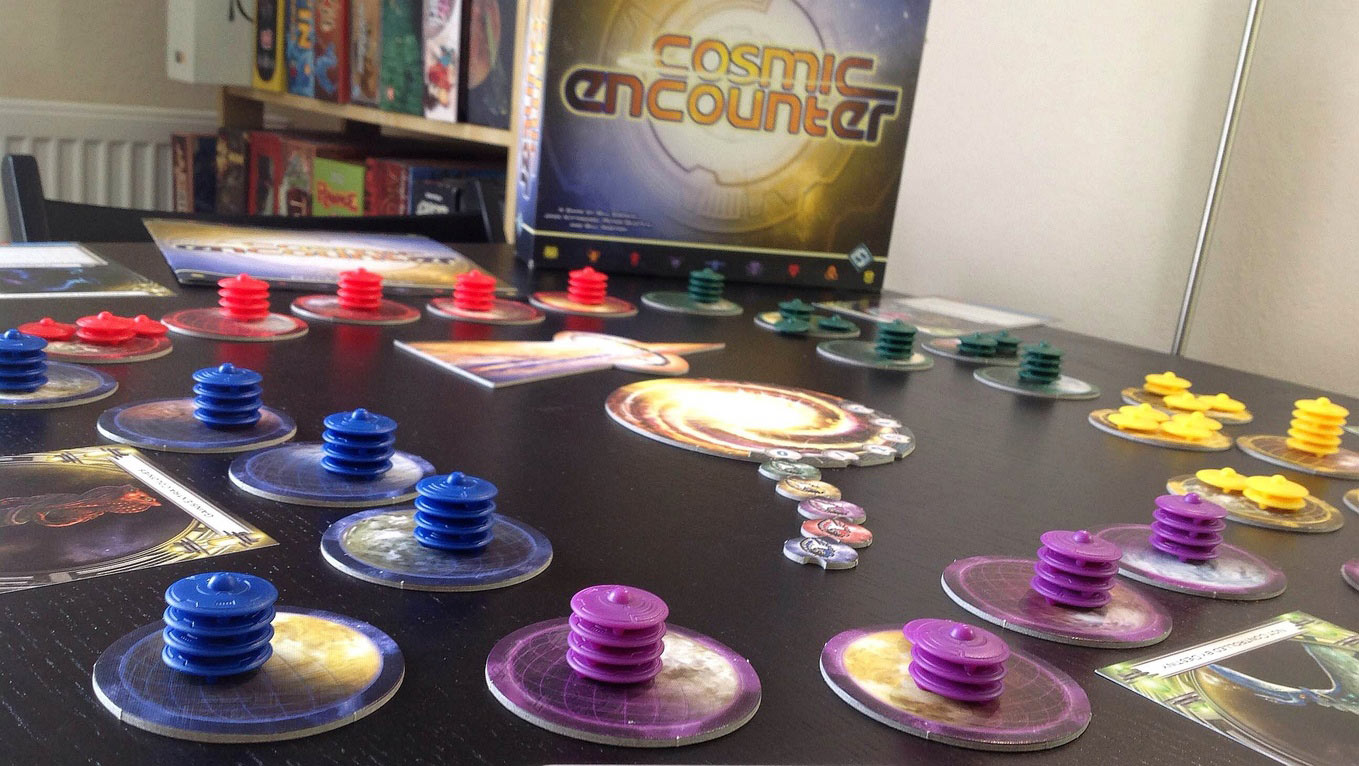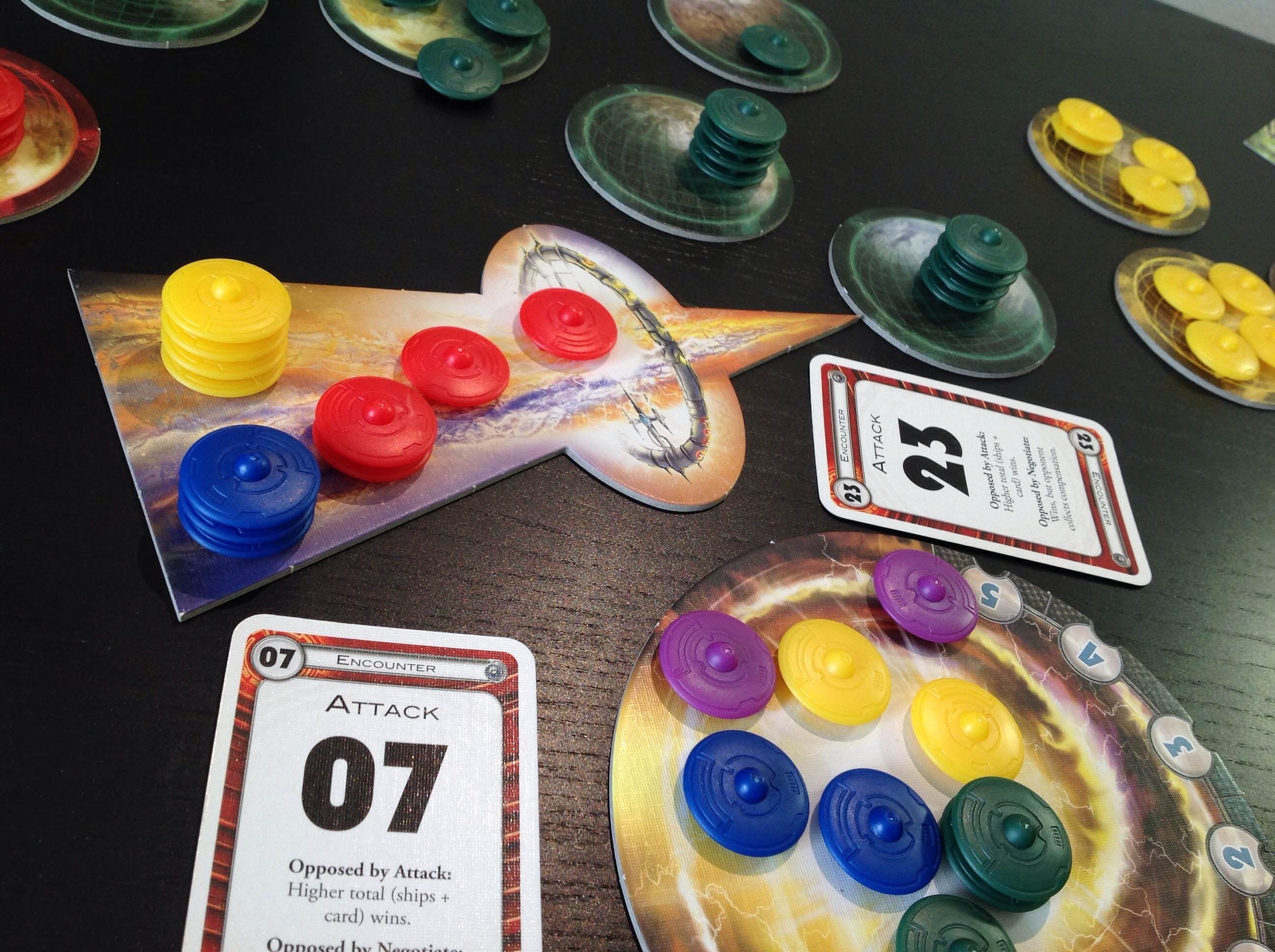Cosmic Encounter is one of my favourite boardgames. It may even be my favourite boardgame, but I probably need to play it more than I currently do to make sure.
(This isn’t a review—you can find reviews aplenty on boardgamegeek.)
Early Cosmic
I started playing Cosmic Encounter in 1981 or so. I had just begun roleplaying (Traveller), and the advert for Cosmic Encounter in Games Workshop’s catalogue caught my eye. Once it arrived, I was hooked. We played it incessantly—both with my RPG buddies (in and around games of Traveller) and my ‘normal’ school friends.
The penultimate week of the school year was ‘project week’. We had the opportunity to do exciting things like youth hostelling or parachuting. One topic, generally reserved for those that couldn’t afford the exciting projects (or weren’t able to get into the popular projects), was boardgames. This was the early 80s and I was miles away from the nearest games shop. Boardgames meant Monopoly, Escape from Colditz, Cluedo and its friends. (Even the Spiel des Jahres was in its infancy and wasn’t something I’d learn about for a few years.) Anyway, I chose (yes, chose) boardgames for two years and brought in Cosmic Encounter for the week. I mention all this because I remember one girl who was clearly not happy to be playing boardgames; but there was one game she would play: Cosmic Encounter.
Which alien is best?
Before I started buying expansions, I tracked the success of the aliens. To my surprise, Philanthropist was the alien most likely to win. This alien lets you give a card to your opponent—which means you give away your rubbish cards and keep your good ones. It also means you draw more cards—something that would become known as ‘card advantage’. So over a decade before Magic: The Gathering popularised the term, Cosmic Encounter taught me the importance of card advantage. Since learning that, I’ve always preferred powers that let me draw cards, and shied away from those who hoard their hands.
The second most successful alien was the most obvious candidate: Virus. Virus multiplies its attack card, and is strong in challenges. But not as strong overall as Philanthropist.
Third, I think, was Laser. Last was Clone—I’ve never liked Clone (probably because I like drawing cards). Clone only works if you’ve got an encounter card you want to keep, and it means that you’re rarely drawing new cards and so miss out on Artifacts (or Edicts as they were known then), Flares and other goodies in the deck. I wouldn’t inflict Clone on a new player either—it’s not fun enough and doesn’t sell the craziness of Cosmic Encounter at its best. (It’s okay as a second power in the right combination, which is why I haven’t thrown it out.)
My favourite power, though, is Sorcerer (you may switch cards) as I love the delightful mind tricks it creates. (Sadly I don’t play the new aliens enough to know if I have a new favourite.)
I liked the hex boards—they set Cosmic Encounter apart from the other boardgames of the time. And changing to a regular board was one of several things that Games Workshop did horribly wrong with their version. But as much as I liked the hexes, I prefer Fantasy Flight’s planet design. Definitely the best.
Expansions and other editions
It wasn’t long before I had all the Eon expansions, including the weird hexes. Despite having all the expansions, we didn’t play them much (besides the extra aliens and 5th and 6th players). Moons were too silly and slowed the game down. (I’m not a fan of expansions that slow games down for little return.) Lucre wasn’t exciting enough, and the alternate hexes weren’t that good—although we used the alternate cone and Praw a fair bit.
I bought the awful Games Workshop edition and was disappointed with the mess they made of it.
I didn’t get the Avalon Hill edition, but I bought Mayfair’s Simply Cosmic (which disappointed me as it didn’t have enough of the craziness I craved).
In the deep freeze
Then I stopped playing.
I moved away from home and didn’t get a regular boardgame group until after the renaissance started in the 90s. So while Settlers of Catan and Magic: the Gathering became popular with my roleplaying group, Cosmic Encounter remained in my cupboard, unplayed.
Since 2000 I have probably played more boardgames than ever—but, sadly, Cosmic Encounter has not been amongst them. There have, I think, been a few reasons for this:
- Until the Fantasy Flight edition, the only copy I had that was worth playing was an ancient Eon copy full of expansions held together with sticky tape. Cosmic Encounter had to compete against newer games with their better graphic design, and Cosmic Encounter lost.
- Gameplay has improved since Cosmic Encounter came out. When it was first released, Cosmic Encounter compared favourably to Monopoly and Cluedo. Now it must compete against Ticket to Ride, Carcassonne, Wingspan and others. Unsurprisingly, Cosmic Encounter sometimes shows its age.
- I have learned that an hour is my preferred length for a boardgame. I normally don’t want to play a single game for much longer than that—that should be enough to give you a good, solid game and still have time to play something else later on. (Also an hour often suits real-life commitments.) Cosmic Encounter, unfortunately, often takes longer than that. Even longer if you are introducing new players. (I don’t mind setting aside longer for a good game, but an hour often works for the casual gamers I usually play with.)
- The learning curve for Cosmic Encounter is steep, especially if you add all the craziness (which is how I like to play). However, without the craziness (and if your new players haven’t got into the spirit of it), Cosmic Encounter can be a bit pedestrian.
Three player Cosmic Encounter—with two players
But I still want to play.
Unfortunately, Cosmic Encounter doesn’t appeal to Mrs H, but luckily Megan is happy to play. So I created a dummy player for three-player Cosmic Encounter, which we play now and again. It’s not as good as a full player, but it’s better than nothing.
The dummy player always has a mandatory power and draws encounter cards from the deck (it has no hand). I created a deck of cards for the dummy player’s decisions—how many ships to commit, asking for allies, whether to ally when invited, and whether to make a deal. Other decisions (such as where ships are taken from or which planet to attack) are usually obvious and agreed among the players. The dummy player has been known to win before now...
Favourite boardgames
Recently I thought about my favourite boardgames (which currently include Glory to Rome, Dominion, Oceans, Wingspan—and Cosmic Encounter) and noticed that I like games with variety. Games with lots of stuff that let you do different things—I like a game that forces you to make the best of what you’ve got and work for the win.
Do I like Cosmic Encounter because I like those kinds of games, or do I like those kinds of games because I like Cosmic Encounter?
House rules and variants
Cosmic Encounter has always seemed a game that encourages house rules, and I’m no different. So these are my house rules.
If you’ve got a vacant planet in your system (ie, completely empty with no colonies), then you can colonise it for free when moving your ships (from the warp, or returning from a successful defensive alliance, or whatever). I’ve always played this way—because it’s always more fun to have the use of your alien power than not to have it.
I don’t use the Fantasy Flight rules for the cone (or gate). As per the original Eon rules, defensive allies always go on the ring on the cone, while offensive allies sit with the attackers in the mouth of the cone. (Okay, that’s not really a house rule, just me refusing to move with the times.)
One thing I don’t like about the new edition is the scoring tracker. Partly that’s because it can take up so much space, especially if everyone is on the same score (although I could put the scoring tokens on top of each other). Also, I don’t always remember to move the scoring track as colonies are won and lost. Mainly, however, I remember the delight (or frustration) of winning (or losing) Cosmic Encounter because we had not paid attention, and a player already on four colonies was asked to ally with the attack. The scoring track makes it much easier to keep an eye on who is in the lead, making those delicious sneaky victories much harder.
Cosmic Encounter and the future
So I think that’s about it—Cosmic Encounter and me.
Going forward, one thing I haven’t explored is playing Cosmic Encounter online using Tabletop Simulator. Perhaps that’s something to explore.


.jpg)
.jpg)

